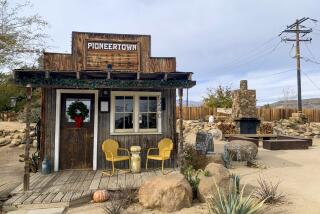Taxpayers Own a Whole Town Because of an S&L;’s Failure
- Share via
Lehigh Acres is a typical town in southern Florida, a planned community with 25,000 residents, an industrial park, a pizza parlor, two Chinese restaurants, a hardware supply store and a newspaper.
But it claims one distinction: Because of the savings and loan crisis, it is owned by the American taxpayers.
The federal government owns the hardware store, the newspaper, two 18-hole golf courses, a 121-room motel and its restaurant, a 1,700-seat auditorium, more than 10% of Lehigh’s 60,500 acres and even the town’s largest employer, Land Resources Corp.
In fact, it is because of Land Resources that the government owns the rest. Land Resources--which founded, built and owned Lehigh Acres--was one of the assets of a failed savings and loan in Arizona that was taken over by the government.
Now Lehigh Acres is for sale as federal officials scramble to reduce the taxpayers’ cost of cleaning up the savings and loan industry.
Federal S&L; regulators in effect have put up a big “for sale” sign on the town’s front lawn, aggressively seeking bids from as far away as Asia and Europe to try to find a buyer willing to invest in an entire community.
In a brochure soon to be mailed to potential bidders, the government says its property in Lehigh Acres, an unincorporated town 12 miles southeast of Ft. Myers, also includes a utility company, which operates water and sewer systems, a propane gas delivery system and a trash collection service.
“Lehigh Acres is as close to owning a town as you can come, and there’s no question the federal government owns it lock, stock and barrel,” said William W. Crocker, the government-appointed president of Security Savings & Loan in Scottsdale, Ariz.
Security, which owned Land Resources, is being operated by federal regulators until they can sell it or close it after Congress passes savings and loan bailout legislation, which will provide the funds to pay off depositors.
“S&Ls; have often ended up owning things they didn’t intend to,” Crocker said.
S&L; regulators in Washington can get a chuckle out of the situation, acknowledging that it underscores the absurdity as well as the gravity of the nationwide S&L; problem. Hundreds of bankrupt S&Ls; have been seized by regulators in recent years, and many more will be taken over in the months ahead.
In the process, the federal government expects to wind up owning as much as $500 billion worth of property, an amount that even veteran real estate managers have trouble imagining.
Failed financial institutions have dumped into the government’s lap such unlikely holdings as race horses, McDonald’s restaurants, a bordello in Nevada, a major share of the Dallas Cowboys and a nitrogen-cooled tank filled with vials of buffalo semen.
And now a town.
“Repossessed real estate is going to be the No. 1 business problem facing the Southwest and many other areas of the country in the years ahead,” said Arizona’s supervisor of financial institutions, Hank Rivoir, expressing a sentiment many regulators share.
The story of how the federal government came to possess the key to an entire town began in 1983, when Security Savings & Loan bought a 64% stake in Land Resources as an investment.
The acquisition, which meant that Security would have about 15% of its assets in one investment, was contingent on the Arizona Legislature’s willingness to pass a bill to permit a state-chartered S&L; such as Security to invest that much in one property. The Legislature obliged.
In 1984, Security ended up with 100% ownership of Land Resources when it had to step in and pay more than $100 million in debt that the developer owed to Citicorp.
Security itself then went into decline and this spring was among more than 200 savings and loans that federal regulators seized because they were in such bad financial shape.
The development company created Lehigh in 1954 by buying what was then called the Lucky Lee Cattle Ranch in Lee County. The county was named after Confederate Gen. Robert E. Lee, and, because the ranch was on the county’s highest ground, the town was named Lehigh.
Today, Lehigh has 1,450 miles of paved roads, four shopping centers, an industrial complex, two elementary schools, a middle school, a hospital, three banks, five S&Ls; and 20 churches.
Because it is unincorporated, it has no official local government, although it has an honorary mayor, Liz Eils. It is governed by Lee County, which provides police and fire protection and public education.
“It’s been successful as a community if not as a business investment,” said Charles Bigelow, chairman of the county commissioners of Lee County.
County officials and employees of Land Resources interviewed in recent days said they were vaguely aware that Land Resources’s parent company, Security Savings & Loan, was in financial trouble.
They did not know, however, that it has been taken over by the government, and that, as a result, Land Resources and Lehigh Acres had been, too.
“I was not aware that the federal government was the developer,” Bigelow said. “We’ve never dealt with a developer with an army before.”
Upon learning that a foreign owner might take over the company, the editor of the Lehigh Times, Judi Barker, an 11-year resident of the town, said, “Egad.”
Said county official Bigelow: “The company, it appears, has kind of been limping along, so some new vigor would be welcome.”
In the meantime, there are some advantages in the federal government’s role as the town’s owner. “As you can imagine, the newspaper is very kind to us,” said Crocker, the government’s man at Security Savings.
More to Read
Inside the business of entertainment
The Wide Shot brings you news, analysis and insights on everything from streaming wars to production — and what it all means for the future.
You may occasionally receive promotional content from the Los Angeles Times.










